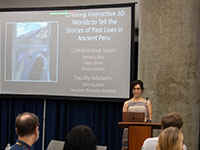2022-2023 COLFA Collaborative Digital Humanities Fellows Competition
The COLFA Digital Initiatives (DI) invites applications for the 2022-23 COLFA Collaborative Digital Humanities Fellows. The purpose of the Collaborative Digital Humanities Fellows program is to form the foundation of an academic conversation in digital humanities studies in COLFA. The Collaborative Digital Humanities Fellows (CDHF) program will create a cohort that will conduct projects focusing on digital storytelling.
This 2022-23 CDHF program is designed to support COLFA faculty and students’ 1) professional or creative projects, 2) preliminary projects for research articles, theses, or dissertations, 3) course development in Digital Humanities, and 4) learning and collaborations that enhance classroom projects in digital storytelling. Fellows can use this program as short-term achievements for their long-term plans. In this Fellows program, Fellows conduct projects that raise awareness, educate people, develop stories, benefit the community, and build a forum for social change. Possible projects for Fellows to refer to can be found at https://storiesforall.org/project-portal/. A list of potential projects can be as follows but are not limited to:
The program period is from October 2022 to May 2023. COFA DI plans to award up to five teams. Each fellows team consists of one advisor (can be COLFA faculty or from other colleges, universities, or communities), one faculty fellow (COLFA only), and one student fellow (COLFA only). The team develops one project and completes it by the end of the program in May 2023. The advisor receives $2,000 as compensation. The advisor supervises and guides the team for a successful project outcome. The faculty fellow receives $2,000 as a stipend. The student fellow receives $2,000 as a stipend. Only COLFA faculty (TT and FTT) and students (graduate and undergraduate) can participate in the competition. Each team receives $1,500 for project expenses. Project expenses can be used for 1) academic events such as invited speeches, 2) workshop training, 3) travel for related activities, or 4) support for student projects. Each team may have more than one member in each position. The fund allocated to the position will be split equally by the number of members (e.g., two advisors: $1,000 each).
COLFA DI will host 1) multiple training workshops, 2) colloquium sessions, and 3) networking events for the teams during the program. At the end of the CDHF program in May 2023, COLFA DI will host a symposium to showcase the teams’ complete projects.
Process
- Only COLFA faculty and students can participate in this program, except for the advisor.
- Advisors can be from COLFA, other colleges, universities, academic fields, or communities.
- Fellows are not required to submit a budget.
- Two information sessions will be held in September 2022.
- COLFA DI invites workshop trainers and guest speakers. They receive honoraria for their contributions.
Review Committee*
- Jessica Nowlin (PHI)
- Nazgol Bagheri (POL)
- Sylvia Fernandez (MLL)
- Hejin Shin (LIB)
- Seok Kang (COM)
- Sue Hum (ENG)
- Amy Rushing (LIB)
- Joe Roy (ASEE)
- Omar Valerio-Jimenez (HIS)
- Red Madden (COM)
*If review committee members participate in the competition as advisors or fellow applicants, they are not eligible to stay on the review committee.
Timeline
- June-July 2022: Review Committee formation
- August 2022: Call for proposal announced
- August-September 2022: Two information sessions (one in August and one in September)
- September 16, 5 p.m. 2022: Proposal deadline
- October 3, 2022: Fellows teams selection
- In selection, the Review Committee puts the best effort to equally distribute the fellows teams to the nine Departments (AAH, ANT, MLL, COM, HIS, POL, ENG, PHI, MUS).
- October-November 2022: One training workshop, one colloquium
- December 2022: Networking event
- January – March 2023: One training workshop, one colloquium
- April 2023: Networking event
- May 2023: Symposium to showcase Fellows’ complete projects
Fellow Requirements
- Eligible to COLFA faculty, graduate students, and undergraduate students only.
- Apply as a team (one advisor, one faculty member, and one student).
- Attend and participate in workshops and colloquia.
- Attend and participate in informal networking events.
- Present projects and discuss with other teams at colloquia or happy hours.
- Present projects at the final symposium.
Application Process
- Each team (one advisor, one faculty member, and one student) submits a short version of 2-page CV for each member (advisor and fellows) in one file.
- Proposal (2-3 pages, single-spaced, 12 -point font type, 1-inch margins). Proposal page limit excludes title page (title, applicant names, and information), endnotes, and references.
- Introduction
- Project details
- Expected outcomes
- Contribution
- Timeline
- Submit the proposal package as one pdf file, including proposal and CVs, via CAYUSE
- Complete an intake form (Notice of Intent)
- Submit your application to
- Intake Form: The Intake form asks basic information about your application and assists us with planning across investigators/submissions. As appropriate, the RSC will develop a checklist of required documents for your application and will help you shepherd your application through cayuse.
- CAYUSE: Cayuse delivers a hosted Web solution created specifically for Grants.gov and the complex federal grant proposal process. Cayuse helps organizations of all kinds collaborate on, manage, apply for federal funding, streamline proposal development and protect research funding with the industry’s leading Web-based proposal development platform.
- 5:2: The 5:2 rule was put in place to help ensure your proposal is submitted on time. The 5:2 rule refers to the number of business days required for proposals to be routed and finalized. Five business days before the proposal deadline, the PI is required to upload non-technical documents to Cayuse (i.e., budget justification, bio sketches, current/pending support, references cited, letters of support). Two business days before the proposal deadline, technical documents are due (i.e., routing form, internal approvals in Cayuse, abstract, project description, research strategy, etc.). Plan to process proposals in CAYUSE in advance to avoid missing the submission deadline.
- Upon CAYUSE approval, submit the application package to the One Drive Form
- The submission file should be labeled as full_name.pdf.
- Deadline: September 16th, 5 p.m., 2022.
For more information, please contact Director Dr. Seok Kang ( seok.kang@utsa.edu).
2022-23 Collaborative Digital Humanities Fellows Competition Winners
1) Creating Interactive 3D Worlds to Tell the Stories of Past Lives in Ancient Peru
In this project we explore how the co-creation of ancient 3D worlds using GIS, procedural modeling, VR, and AR can lead to new dialogues between archaeologists and community partners to define the value of the past in the present. Our proposed work builds on the core team’s (Rebecca Bria, Kalei Oliver, and Bruce Carlisle) collaborative work with the Quechua-speaking, agropastoral community of Hualcayán, located in highland Ancash, Peru. Rebecca Bria has conducted archaeological research in Hualcayán for 12 years, revealing Hualcayán’s occupation spans an exceptionally long period from 2400 BC, during the rise of Andean complex society, to around AD 1450, during the expansion of the Inka empire (Bria 2017, 2021). Our work this summer began the process of developing and deploying VR and AR experiences with the community, a process that was well-received (see endnote Figures 1 and 2). Historically, the realities of systemic poverty and climate change, among other factors (see Bria and Walter 2019), have led many people at Hualcayán to see little connection to or value in their heritage resources (Bria and Cruzado Carranza 2015) and our feedback suggests immersive 3D technologies can help descendant communities meaningfully reengage with their heritage.
Faculty Advisors
John Quarles
Professor, Department of Computer Science, College of Sciences, UTSA
Heather Richards-Rissetto
Associate Professor, Department of Anthropology and School of Global Integrative Studies, College of Arts and Sciences, University of Nebraska—Lincoln
Faculty Fellow
Rebecca Bria
Assistant Professor, Department of Anthropology, COLFA, UTSA
Student Fellow
Kalei Oliver
PhD student, Department of Anthropology, COLFA, UTSA
Creating Interactive Worlds Project Link
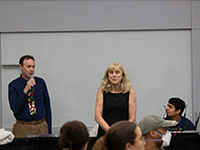 2) This is our classroom: Interdisciplinary collaborations in a study abroad setting
2) This is our classroom: Interdisciplinary collaborations in a study abroad setting
Our work on the project so far has generated a trove of resources including digital presentations from student teams, reflection videos from individual students, descriptions of experiential learning activities, and learning outcomes. As COLFA Collaborative Digital Fellows, we will develop these materials to create a compelling digital story in two related formats. The first is a permanent digital website that will house the project and make it freely available. The website will include descriptions and details of the five teamwork topics, the final presentations from each team, and compilations of student reflection videos organized by the common themes we have already identified (growth, special moments, our classroom, the unexpected, creativity, connections, insights). We plan to use Adobe Portfolio for this portion of the project. The second format is a pedagogical guide to be published in Pressbooks that will provide instructions and guidelines for faculty who wish to continue the project either in upcoming COLFA Semesters in Urbino or on campus. We will outline our learning objectives, discuss outcomes, and provide practical guidance for creating digital projects with collaborative teams. We plan to expand our instructional materials for group projects including guidance for establishing roles, ground rules, and group charters; this will include tutorials and guidelines for creating a digital presentation using narratives and story prototypes, instructions on filming and scripting, and guidelines for using Adobe Premiere Rush to edit and enhance video content. This project is a model for cross-disciplinary experiential learning. We will share our approaches and objectives so that they can be replicated and modified for future teaching opportunities. We are also looking for opportunities to explore additional digital tools for data gathering and analysis, such as ArcGIS, that will assist us in constructing and mapping digital narratives. We are very excited about the workshop format of this fellowship and the possibility of gaining experience with digital platforms that are not yet familiar to us.
Faculty Advisor
J. Drew Stephen, Associate Professor of Musicology
Faculty Fellow
Bridget Drinka
Professor of Historical Linguistics
Student Fellow
Brandon Davis, School of Music, UTSA
Interdisciplinary Project Link
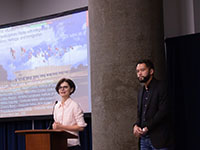 3) The Museum of Texan Cultures Reimagined: Interdisciplinary Stories with Integrated Arts in South Texas History, Heritage, Migration and Immigration
3) The Museum of Texan Cultures Reimagined: Interdisciplinary Stories with Integrated Arts in South Texas History, Heritage, Migration and Immigration
Texan Cultures Reimagined is a joint endeavor between COLFA Fundamentals of Museum Studies course and the UTSA Institute of Texan Cultures, simultaneously providing enriched course learning and improving the ITC outdated resources. The project can be considered a preparatory laboratory that harmonizes with the ITC Centenary by reimagining the ITC as an intersectional multicultural public institution with the help of young creative minds interested in museum work. In addition, the grant will provide the necessary opportunity for field work and resources for organizing a museum studies student exhibition both online and in situ that engages San Antonian and Texan history, social justice, immigrant, indigenous, and ethnic minority issues. The project provides students who may want to consider the museum field as their chosen profession with valuable hands-on experience in planning, executing, designing, and marketing an exhibition with the help of experienced museum staff. It also allows them to research local history, heritage, social justice issues, and immigration. The graduate students will actively support the undergraduate project development and exhibition logistics, incorporating their experience into a research-based exhibition project plan that aligns with their interests and background. Since the future of museums cannot be separated from our digital age, a large part of this work will be carried out using digital resources. The project will become part of the core curriculum in Museum Studies, showcasing joint efforts within UTSA to improve community ties and learning.
Advisor
Nansy Lopez Gutierrez, Institute of Texan Cultures
Faculty Fellow
Edit Tóth
Art and Art History Department
Student Fellow
Chance Brown, MFA Program, UTSA
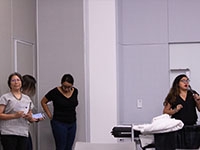 4) Concientizando Comunidades: Alternative Archives of Leadership and Activism in Texas
4) Concientizando Comunidades: Alternative Archives of Leadership and Activism in Texas
This collaborative digital humanities project centers on creating a digital and public exhibit of three collections of leadership and activism in Texas. To do this, each faculty member involved will focus on a specific theme under this larger project that highlights the approaches, strategies, forms of leadership and activism by various actors living, working, and leading in Texas. This includes:
- the Chicanx program directors and coordinators at community colleges and universities across San Antonio that labor to keep Mexican American Studies programs alive and thriving.
- Activists, professors and journalists in El Paso that have been involved in the movement against gender violence and feminicides in Juárez by pushing for local politicians and the US government to intervene in the situation, supporting organizations in the Mexican side with funding and teaching and reporting about the situation in communities across Texas and the United States.
- Leaders, activists, and cultural producers who have challenged settler colonial practices in public space through cultural organizing, artistic production, and cultural critique in public writings.
Faculty Advisors
Lilliana Patricia Saldaña (CAPRI)
Sylvia Mendoza (REGSS)
Faculty Fellow
Sylvia Fernández
Modern Languages and Literatures
Student Fellow
Miriam Herrera-Valdez (COLFA Student)
Alternative Archives Project Link
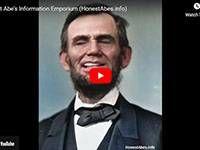 5) Honest Abe’s Information Emporium
5) Honest Abe’s Information Emporium
Our project rejects such nihilistic interpretations. Instead, we intend to show that the same technologies that have been used to disrupt, disinform, and demean can be repurposed as pedagogical tools that educate, enlighten, and entertain. To demonstrate as much, we are building an open-access, not-for-profit, non-partisan educational website that teaches visitors about the rise of synthetic media and its potential impact on both the historical record and the general public. This website will provide resources, tutorials, and lesson plans to help promote informed citizenship, digital literacy, and humanistic inquiry. If we are fortunate enough to receive a COLFA Collaborative Digital Humanities Fellowship, then we will add two distinct but related projects to the site: 1) “Discursos Grandes,” and 2) “Gettysburg Address in Translation.” For both of these projects, we will produce dozens of short videos (>1 minute) using a variety of smartphone apps, social media filters, and rudimentary software packages. We have already started building the website where these two projects will be hosted. We invite members of the selection committee to follow our ongoing progress at the following temporary URL ( https://26o.bd1.myftpupload.com/), but we ask that you not share the link with anyone else since the site remains under construction.
Faculty Advisor
Jerry Gonzalez, Associate Professor, Department of History
Faculty Fellow
Abe Gibson
Assistant Professor, Department of History
Student Fellow
Rebecca Gonzalez, Graduate Student, Department of History
Other possible ideas for projects
- San Antonian Digital History Project in Partnership with Museums
- Lives of Teachers in Challenging Times
- Poverty, Equity, and Justice in Modern Texas
- Short Videos on Inspiring Music in Urban Communities
- A Metaverse Village of UTSA
- Building Black San Antonio through Digital Storytelling
- Interdisciplinary Stories with Integrated Arts in South Texas
- Digital Stories on Texan immigrants
- Digital Storytelling of Health Data for Underserved Population in San Antonio
- The Creation of Digital Collections on Political History in Texas
- Analytical Linguistics Database on Marginalized Groups
- Visualizing San Antonio History
- Data Visualization of Military Health
- Podcasts Project on Latinx Immigrants in San Antonio

